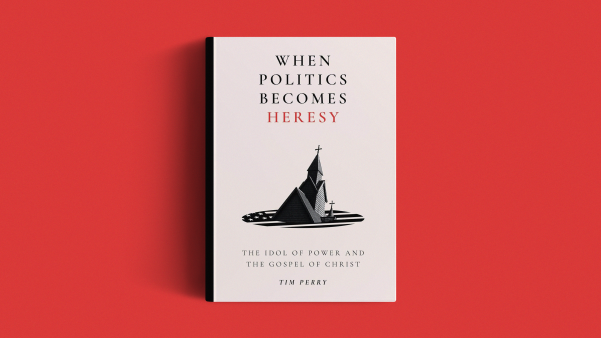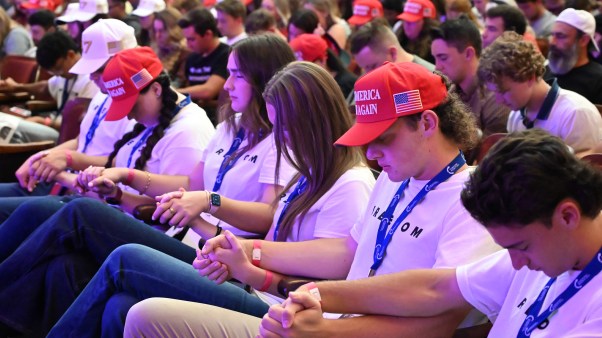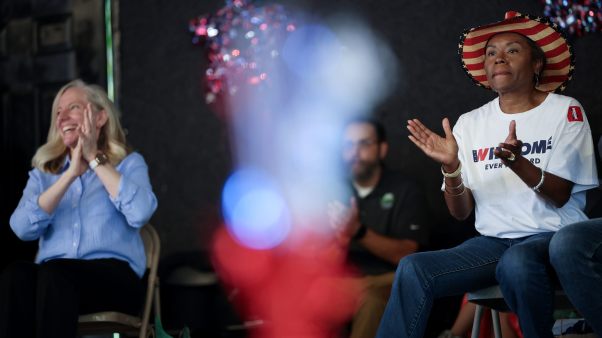Pastor Gus Booth remembers when he used to simply encourage his congregation of 150 in Warroad, Minn., to vote each Election Day. Now, he thinks it's important to tell them which candidate should get their vote.
On Sunday, as part of the "Pulpit Initiative" organized by an Arizona-based conservative Christian legal group, Booth is set to join dozens of clergy nationwide in challenging Internal Revenue Service rules that prohibit churches from politicking by supporting or opposing candidates.
"If we can tell you what to do in the bedroom, we can certainly tell you what to do in the voting booth," said the Minnesota minister, an evangelical leader of a nondenominational church, who expects to endorse Republican John McCain during his "Pulpit Freedom Sunday" sermon.
"The voting booth is not some sort of sacred cow that you can't talk about. You're supposed to bring the gospel into every area of life."
The Alliance Defense Fund announced the initiative last May as a way to challenge IRS rules that date to 1954. ADF spokesman Greg Scott said the organization contacted "pastors, priests and rabbis from every major denomination," and knows of 33 clergy in 23 states who intend to take part on Sunday.
At least one clergyman who was contacted joined in filing a complaint against the initiative with the IRS.
"We're basically aiming to get these rules declared unconstitutional so that pastors have the right to speak freely from the pulpit without fear of punishment," said Dale Schowengerdt, legal counsel for the ADF.
He said his group is not telling pastors what to say, or whether to endorse specific candidates, but stands ready to support them if complaints are filed against them.
IRS spokesman Eric Smith said the agency is aware of media coverage about the initiative and "will monitor the situation and take action as appropriate."
Rob Boston, senior policy analyst at Americans United for Separation of Church and State, said: "If we uncover instances of churches stepping over the line, we'll be sending complaints to the IRS."
The IRS already has received two complaints from critics who believe the ADF efforts violate federal law — one from three tax lawyers who are former IRS officials, and another spearheaded by Ohio clergy.
Marcus S. Owens, a Washington tax lawyer who previously directed the IRS' Exempt Organizations Division for a decade, urged the IRS to investigate whether the ADF has violated the agency's ethical rules by encouraging pastors to violate IRS regulations.
"They have real force and effect," he said of the ethics rules that are capable of ending some lawyers' careers.
Owens is representing the Rev. Eric Williams, a United Church of Christ minister in Columbus, Ohio, and dozens of other clergy who also sent a complaint to the IRS, alleging that the ADF is "coordinating a mass violation of the law" and should be halted from soliciting churches to participate.
"People can disagree on all the issues that face the voters but … we can agree on the role the faith community plays in empowering, but not directing the voter how to vote," said Williams, who was among clergy contacted by the ADF.
Groups ranging from the Baptist Joint Committee to the American Humanist Association have criticized ADF's plans. The Interfaith Alliance has begun collecting signatures of clergy who pledge not to endorse candidates. Catholic Archbishop John C. Favalora of Miami wrote in a diocesan column that "the role of the church is not to be like the 'party boss' who goes around telling people how to vote."
A recent poll by the First Amendment Center found that 40 percent of respondents said religious leaders should be permitted to endorse candidates from the pulpit without endangering their tax status, compared to 54 percent who disagreed.
In addition, LifeWay Research released a poll Wednesday finding that 13 percent of respondents agreed that it is appropriate for pastors to publicly endorse candidates for public office during a church service; 54 percent approve of a pastor's personal endorsement of candidates outside of their church.
Booth, who became a McCain supporter after former Arkansas Gov. Mike Huckabee dropped out of the race, has a sort of "been there, done that" view of the initiative, since he already told his congregants last May not to vote for Sen. Barack Obama or Sen. Hillary Clinton. Americans United has sought an IRS inquiry into that sermon but, on the advice of his ADF lawyers, Booth would not comment on whether he had heard from the tax agency.
Copyright © 2008 Christianity Today. Click for reprint information.
Related Elsewhere:
Other articles about the Pulpit Initiative include:
Politics From Pulpit Will Deliver Challenge to IRS | Conservative group seeks court fight on nonprofit law (The Wall Street Journal)
Pastors Plan to Defy IRS Ban on Political Speech | Ministers will intentionally violate ban on campaigning by nonprofits in hopes of generating a test case. (Los Angeles Times)
Ban on Political Endorsements by Pastors Targeted | Declaring that clergy have a constitutional right to endorse political candidates from their pulpits, the socially conservative Alliance Defense Fund is recruiting several dozen pastors to do just that on Sept. 28, in defiance of Internal Revenue Service rules. (The Washington Post)








